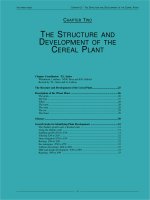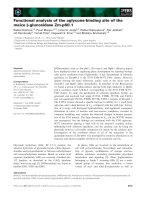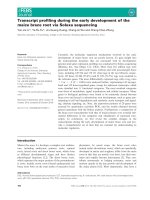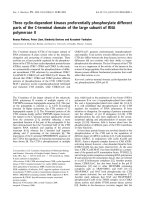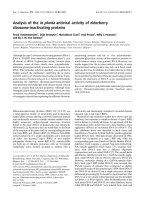parts of the maize plant
Bạn đang xem bản rút gọn của tài liệu. Xem và tải ngay bản đầy đủ của tài liệu tại đây (1.21 MB, 25 trang )
Seminar
Group 1
Đỗ Văn Tình
Võ Minh Tiến
Nguyễn Thị Ngọc Dung
Parts of the maize plant
Topic
Instructor: NGUYỄN VĂN MINH
Game
Game
Consolidation the knowledge
COTTON
SUGARCANE
RICE WHEAT
vocabulary
Brace roots [breis][ru:t] : rễ chân kiềng
Leaf sheath [li:f][∫i:θ] : bẹ lá
Stalk [stɔ:k] : Thân
Node [noud] : đốt
Silks [silk] : râu bắp
Tassel ['tæsl] : cụm hoa đực ở cây ngô
Glume [glu:m] : mày
Flag leaf ['flæg] [li:f] : Lá cờ
Radicle [‘raedikl] : rễ mầm
Maize [meiz] : Ngô
The Maize
Distribution and Importance
In terms of total world production, maize and rice vie for the number two position after wheat. Several
factors account for the importance of maize:
• Maize can adapt to a wide range of temperature, soils and moisture levels and resists disease and insects.
• It has a high yield potential.
• It is used for both human and animal consumption.
Về tổng sản lượng thế giới, ngô và gạo tranh giành vị trí số hai sau lúa mì. Một số yếu tố chiếm tầm quan trọng của ngô:
• Ngô có thể thích ứng với một phạm vi rộng của nhiệt độ, đất và cấp độ ẩm và chống lại bệnh và côn trùng.
• Nó có tiềm năng năng suất cao.
• Nó được sử dụng cho tiêu dùng của con người và động vật.
Maize plants are used in industry, cosmetics, food and animal feed. About 75 percent of all commercial food items contain some form
of maize. More than 50 percent of maize crops are grown for animal feed.
Cây ngô được sử dụng trong ngành công nghiệp, mỹ phẩm, thực phẩm và thức ăn chăn nuôi. Khoảng 75% của tất cả các mặt hàng
thực phẩm thương mại có chứa một số hình thức của ngô. Hơn 50% các loại cây trồng ngô được trồng làm thức ăn cho động vật.
It is used for both human and animal consumption.
Maize plants are used in industry Maize plants are used in food
Types of Maize
There are five principal types of maize:
• Dent: The most widely grown type in the U.S. The seed has a cap of soft starch that shrinks and forms a dent at the
top of the kernel.
• Flint: Widely grown in Latin America, Asia, Africa and Europe. The kernels are hard and smooth with very little
soft starch. It is more resistant to storage insects like weevils than dent or floury maize.
• Floury: Mainly soft starch and widely grown in the Andean region of South America. It is more prone to storage
insects and breakage than harder types.
• Pop: Really an extreme form of flint maize.
• Sweet: At least twice as high in sugar as ordinary maize and meant to be consumed in immature form when only about
one-third the potential grain yield has been accumulated. It is more prone to field insect damage, especially on the ears.
Parts of the maize plant
Corn seeds are planted in the ground, where they soak up water and burst the outer covering, called the pericarp. The
corn seed, or embryo, sprouts and begins growing. Part of the corn embryo grows into the soil and becomes the root
system that absorbs nutrients and water.
Hạt giống ngô được trồng trên mặt đất, nơi họ ngâm nước và nổ tung bên ngoài bao phủ, được gọi là Sừng Bò. Hạt giống ngô,
hoặc phôi mầm và bắt đầu phát triển. Một phần của phôi thai bắp phát triển vào đất và trở thành hệ thống rễ hấp thụ chất dinh dưỡng
và nước.
The mature corn plant begins forming ears with tassels on the top of the plant. Pollen on the tassels fall on silks in the juvenile ears. Pollen is
transferred to the silks by wind, insects or birds. This produces maize kernels in about five days. Mature maize ears are ready for harvest about 20
days.
Cây ngô trưởng thành bắt đầu hình thành tai với các tua trên đầu của nhà máy. Phấn hoa trên các tua rơi trên lụa trong tai vị thành niên. Phấn
hoa được chuyển giao cho lụa gió, côn trùng hay các loài chim. Điều này sản xuất hạt ngô trong khoảng năm ngày. Tai bắp trưởng thành đã
sẵn sàng cho thu hoạch khoảng 20 ngày, kể từ ngày silking.
Plant height Maize typically grows from 1.2 to 3 m tall.
Leaves
Maize forms from 16 to 22 leaves per plant. Leaves form at
each node and alternate (i.e., they appear on opposite sides
of the plant).
Tassel
The tassel forms at the top of the plant and provides the
pollen for fertilizing the ear (also known as a cob).
Flowering
Maize usually forms a single ear ( or cob). The silk is a
collection of tubes that run from each potential grain on the ear.
The pollen lands on each silk and fertilizies the grain, Cobs are
usually 15 to 39 cm long.
Roots Maize
Maize produces both adventitious and brace roots. The brace roots form above ground after plant emergence. Brace roots are
important, it helps plants prop, hold on to land and participants to absorb water and nutrients . If the plant is drought, these roots may
not form adequately.
Ngô tạo ra cả rễ bất định và chân kiềng. Các rễ chân kiềng hình thành trên mặt đất sau khi xuất hiện cây. Brace rễ rất quan
trọng trong việc giảm chỗ ở. Nếu cây đang hạn hán, các rễ này không có thể hình thành đầy đủ.
•
Maize grows well on a wide variety of soils if drainage is good (no waterlogging).
•
It has a deep root system (up to 185 cm) and benefits from deep soils which allow for improved moisture storage in dry spells.
•
The optimum pH for maize is in the 5.5-7.5 range, although some tropical soils produce good yields down to a pH of 5.0 (very acid).
Ngô phát triển tốt trên nhiều loại đất thoát nước tốt (không ngập nước). Nó có một hệ thống rễ sâu (lên đến 185 cm) và lợi ích từ
đất sâu cho phép cải thiện độ ẩmlưu trữ trong các phép thuật khô. PH tối ưu cho ngô là trong khoảng 5,5-7,5, mặc dù một số đất nhiệt
đới sản xuất sản lượng xuống một độ pH là 5.0 (rất acid).
ĐBSCL được đánh giá là vùng đất có nhiều tiềm năng để phát triển cây bắp thế nhưng hiện nay diện tích trồng bắp trong vùng vẫn quá
nhỏ bé và manh mún. Theo lãnh đạo ngành nông nghiệp các địa phương ở đây thì nông dân chưa mặn mà với cây bắp là do còn gặp
nhiều trở ngại, nhất là thị trường đầu ra không ổn định và giá cả bấp bênh.
•
Mekong Delta is rated as the land has potential to grow corn but corn is now planted in the area is too small and fragmented.
•
As leaders of the local agricultural farmers here are not indifferent to the maize crop is due to still face many
obstacles, especially the output market volatility and price uncertainty

